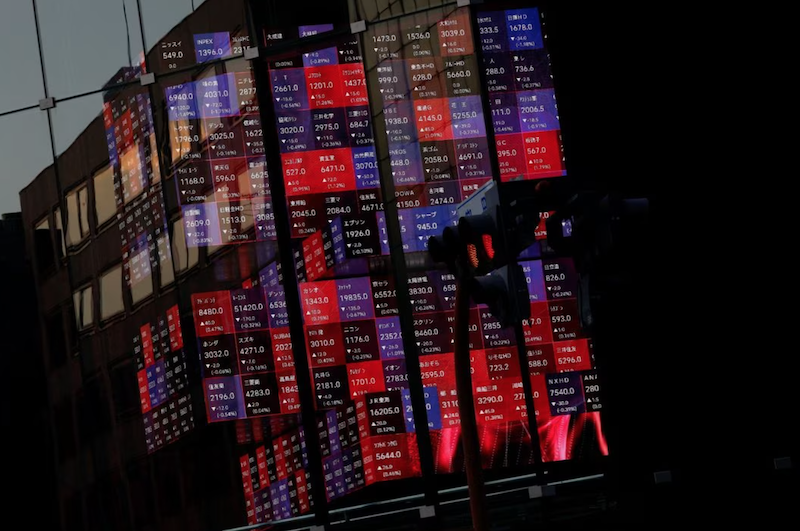Asian shares were in retreat on Friday with investors battening down the hatches ahead of a looming interest rates storm.
It capped a torrid first week of the quarter for financial markets, with the dollar standing tall and bonds crumbling as the resilience of US jobs data has investors bracing for rates to head higher still.
Japan’s Nikkei share average fell for a fourth consecutive day, tracking overnight declines in US stocks.
The Nikkei ended the day down 1.17% at 32,388.42, after accelerating declines in the final half hour of trade. Every Nikkei sector fell, led by an almost 2% slide for real estate. The broader Topix sagged 0.97% to 2,254.90.
The Nikkei has fallen 2.41% this week, after closing at a 33-year high on Monday. Since mid-March, it has rallied nearly 27%.
Also on AF: China’s Ant Group Facing $1.1bn Fine, to End PBOC Revamp
China stocks fell, dragged down by computer and semiconductor shares, as cautious investors awaited further stimulus from Beijing and signs that could affect Sino-US relations. Hong Kong shares also fell, led by technology stocks.
Meanwhile, US Treasury Secretary Janet Yellen began a four-day visit to China on Thursday where she will focus on easing tensions between the world’s two largest economies, despite low expectations on both sides.
The Shanghai Composite Index edged back 0.28%, or 8.97 points, to 3,196.61, while the Shenzhen Composite Index on China’s second exchange retreated 0.67%, or 13.63 points, to 2,030.40.
Hong Kong-listed mainland banks declined 1.2%, and were down 10.5% for the week so far, on track for their biggest weekly loss since 2018.
Tech shares were down 2.0% and the Hang Seng Index fell 0.90%, or 167.35 points, to 18,365.70.
Elsewhere across the region, Sydney, Seoul and Wellington slipped while Singapore, Taipei, Mumbai, Manila and Jakarta also dropped. MSCI’s broadest index of Asia-Pacific shares outside Japan fell 0.6%.
Globally, surprisingly strong partial figures on the US labour market sent selling in bond markets into overdrive.
Two-year Treasury yields burst above 5% and futures pricing started to admit the possibility that the Federal Reserve, as it has projected, will raise rates twice before the year is out.
Ten-year yields steadied in Asia at 4.04% after rising more than 17 basis points in two sessions, but regional markets were under pressure as selling wrapped around the globe, stopping out investors who had positioned for a peak in rates.
US Private Payrolls Jump
“People have been very reticent to accept the idea that central banks are going to take cash rates above 5% and 6% and hold it there,” said Andrew Lilley, chief interest rate strategist at investment bank Barrenjoey in Sydney.
“This is a disorderly move towards reality.”
Private US payrolls jumped 497,000 last month, the ADP National Employment report showed on Thursday, against expectations for a 228,000 increase.
Broader non-farm payrolls data is due at 1230 GMT on Friday. S&P 500 futures were steady in Asia. European futures rose 0.4%.
The buckling bond market gave support to the US dollar, although not too much as yields leapt globally and the fear of intervention has traders too nervous to short the yen.
The euro is down 0.2% on the week at $1.0890. The yen actually rose on Thursday and is hovering at 143.70 to the dollar.
In commodities, Brent crude futures were steady at $76.87 a barrel. Gold, which pays no income, was under pressure from higher yields and flat at $1,914 an ounce.
Key figures
Tokyo – Nikkei 225 < DOWN 1.17% at 32,388.42 (close)
Hong Kong – Hang Seng Index < DOWN 0.90% at 18,365.70 (close)
Shanghai – Composite < DOWN 0.28% at 3,196.61 (close)
London – FTSE 100 < DOWN 0.49% at 7,245 (0934 GMT)
New York – Dow < DOWN 1.07% at 33,922.26 (Thursday close)
- Reuters with additional editing by Sean O’Meara
Read more:
Weak Yuan Boosts Chinese Stampede for Hong Kong Insurance
Security Concerns Seen Undermining Yellen’s China Visit
China’s Services Sector Slowing, Caixin June Survey Shows
























